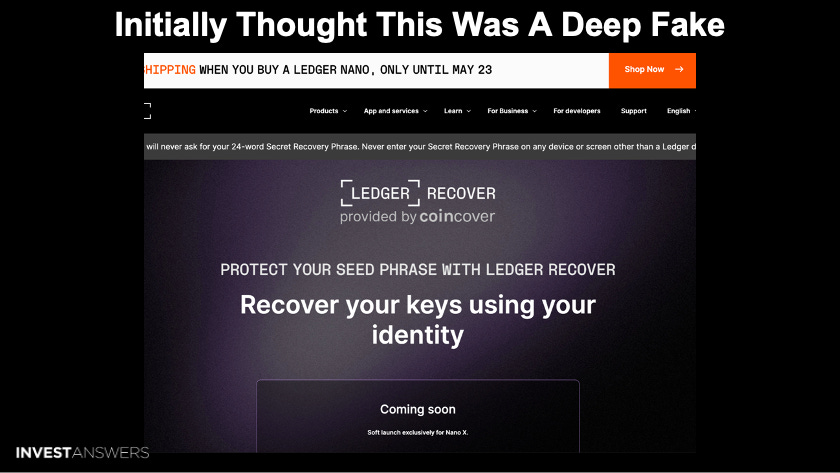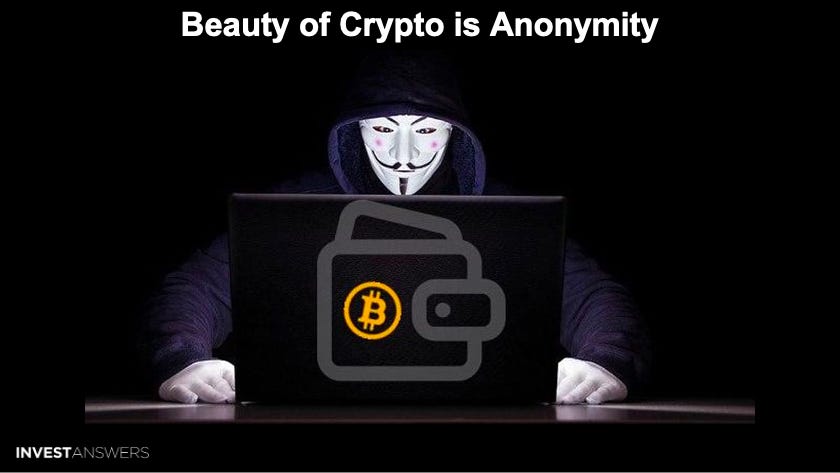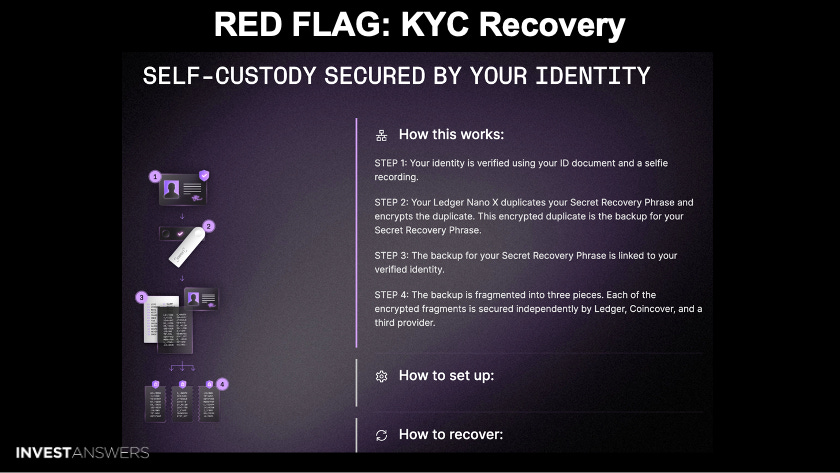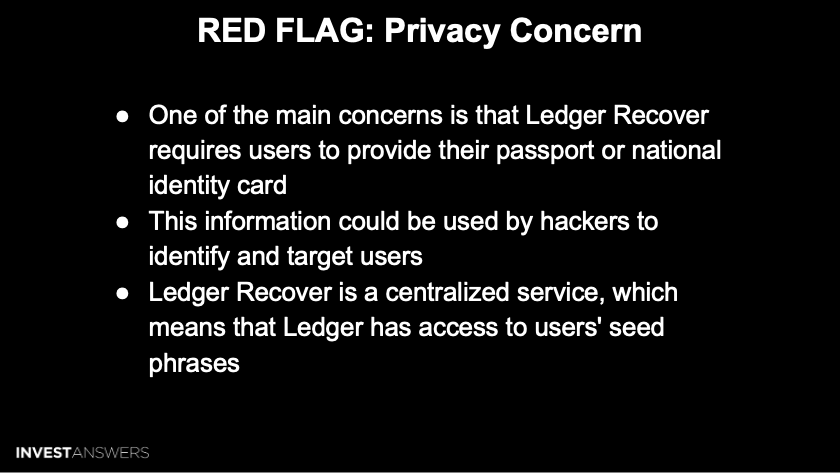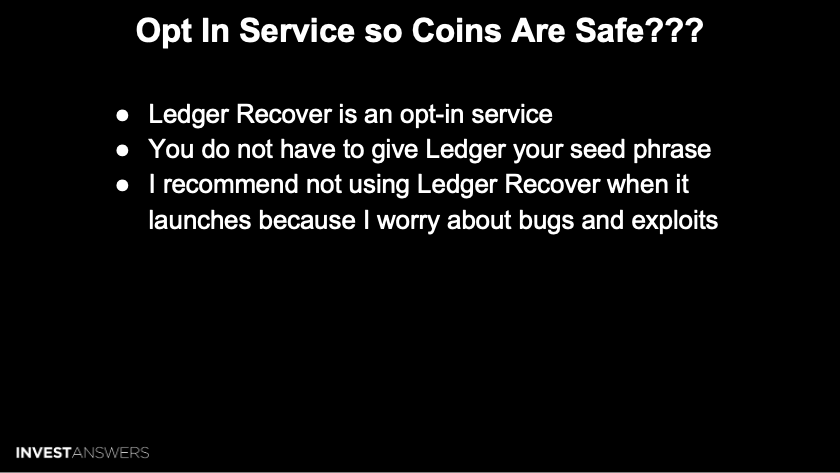NUGGETS OF ALPHA
It takes a lifetime to build wealth and a second to lose it
Your seed phrase is the most important thing in crypto security
Never give your seed phrase to anyone
Everything in your crypto footprint needs to be anonymous
Keep your seed offline at all cost
Ledger has a history of security problems
We like open-source code where experts can analyze it publicly and honestly
Simple to use is dangerous. Harder to use by design means more security
Only buy wallets from official sources
It takes a lifetime to build wealth and a second to lose it. These are the most important lessons that you can learn in crypto.
The seed phrase is the most important thing when it comes to crypto security.
Ledger is definitely living through a Bud Light Moment for Ledger. Bud Light made a huge blunder by embracing a spokesperson who ignored their traditional market.
Introducing the Ledger Recover service that allows users to back up their seed phrases online. Ledger Recover has been criticized by some users, who argue that it could make their funds more vulnerable to attack. This service is going after the casual non-technical crypto users who are unsophisticated about crypto security. The problem is how they designed and rolled out Ledger Recover alienated their core market of highly technical sophisticated crypto users who see this as a betrayal of privacy and security.
This service is entirely against security best practices. We have constantly told our community never to supply your seed phrase to anyone. There are so many scams out there impersonating Ledger or other hardware providers trying to trick you into giving the scammers your seed phrase. It is almost laughable that Ledger would actually develop a service that asks you to share your seed phrase with them.
Everything in your crypto footprint needs to be anonymous.
They are coming out with a service designed to allow you to use KYC to recover your seed phrase. Ledger then would break your seed phrase into three encrypted shards.
Ledger has a history of security problems. For example, in 2020, Ledger was hacked, and the personal information of over 270,000 customers was leaked.
There is a big market for such services, but it goes against the entire ethos of crypto.
It requires users to provide personal information, which hackers could use to identify and target users.
Ledger has access to users' seed phrases, which could raise concerns about the security of users' funds.
It means Ledger has the ability to send the seed somewhere, encrypted or not. It goes against “keep the seed offline at all cost.”
The huge risk here is that your seed phrase can be extracted from the Ledger without you knowing it. They say “only if you choose to do the firmware update”, but eventually, you will need to update the firmware for other applications. The fact that there is a backdoor to extract the seed phrase without your input is a problem. Do you trust that they will not pull it from your device?
Ledger is not open source. In the code they could bury the ability to pull your keys without you knowing it.
We like open-source code where experts can analyze it publicly and honestly.
We all recall the Ledger database leak that happened a few years ago. Ledger suffered a data breach on its database containing its customers' contact details. Although this did not have anything to do with the security of their devices, this blunder shows the firm's lack of good security practices.
The final red flag is the KYC Recovery they want to implement through Ledger Recover. They already blundered customer data with their data breach. How can we trust them to secure the KYC information of customers?
Further, their solution is anti-privacy and anti-security best practices. Given their past blunders in securing customer data and this blunder of rolling out a poorly designed recovery solution, we no longer can trust their security practices.
What could a bad actor do housed inside the company, such as a rogue employee?
One of the main concerns is that Ledger Recover requires users to provide their passport or national identity card in order to use the service. Hackers could use this information to identify and target users. Additionally, Ledger Recover is a centralized service, which means that Ledger has access to users' seed phrases. This could raise concerns about the security of users' funds.
This might be far-fetched, but the EU’s MiCA leadership may want to use Ledger to implement mandatory KYC in Europe.
"Everything should be made as simple as possible, but not simpler" is a reminder that simplicity is a virtue. However, it is also essential to ensure that simplicity does not come at the expense of accuracy or effectiveness.
Simple to use is dangerous. Harder to use by design means more security.
To break down it: the way the service works is you can create encrypted shards of your seed phrase with the device, and you supply those shards to Ledger along with your KYC. This is an opt-in service, so you do not have to give them your seed phrase. And I would recommend people NOT to use this service when it launches because I worry about bugs and exploits.
There is no need to panic. First off, the funds in your Ledger are safe. There is no reason to believe that this firmware update or the Ledger Recovery service has any impact on the current security of your device. The concern is more around Ledger’s security practices and values. They have made too many blunders now, and this is the last straw.
Short Term: DO NOT use the Ledger Recover. It is opt-in, and we recommend you NOT to opt-in. As we continue to preach, do not give your seed to anyone. We would also encourage folks not to update to 2.2.1; by not updating to 2.2.1, there is no risk you will even accidentally use the Ledger Recover.
Long-term: Make a plan to start moving your funds off of Ledger and reduce your dependency on the device. Again, no need to panic. Instead, take your time, document all the cryptos you have on your Ledger, then slowly transfer them out and onto another device. The reason we are recommending leaving Ledger is because this move is the last straw. Ledger has made too many blunders with security. While no funds have directly been lost by their blunders, we can no longer trust their security practices.
As I said, managing crypto custody is one of the hardest problems to solve for the everyday person. However, their solution is too risky. It is anti-privacy and anti-security best practice to give your seed phrase and id to Ledger to manage.
Security: Security is the most important factor to consider when choosing a hardware wallet. The wallet should be designed to protect your private keys from unauthorized access. Some of the security features to look for include:
Air-gapping: The wallet should be designed to operate offline, which makes it more difficult for attackers to access your private keys.
Cold storage: The wallet should store your private keys offline, which makes them more difficult to hack.
PIN protection: The wallet should require a PIN to access your funds, adding an extra security layer.
Firmware updates: The wallet should be able to receive firmware updates, which can help to patch security vulnerabilities.
Ease of use: A hardware wallet should be easy to use, even for beginners. The user interface should be clear and concise, and the wallet should be compatible with your devices. Simple to use is dangerous. The more complicated to use by design means more security.
Veracity: The wallet should be from a reputable company with a good track record. You should be able to find reviews of the wallet online to get a sense of its reliability.
Trezor announced on April 19 that it would be implementing CoinJoin, a privacy feature that combines multiple transactions to make it more difficult to trace them.
CoinJoin is available on Trezor Model T wallets and will be integrated into the Model One wallets later.
The crypto community criticized Trezor's decision to implement CoinJoin, citing concerns about censorship and surveillance.
Keep this as a resource for your alternative considerations to Ledger.
Last year at the Bitcoin Conference, firms were handing out free wallets to attendees. If it is free, do not touch it. Only buy wallets from official sources or the vendor itself.







